In a world where sustainability is becoming increasingly crucial, renovating your kitchen with an eco-friendly approach is a commendable choice. Not only does it reduce your environmental footprint, but it also creates a healthier living space.
This guide will walk you through various aspects of an eco-conscious kitchen renovation, from cabinet materials to water-saving faucets, all designed to make your kitchen not only beautiful but environmentally responsible.
Bamboo vs. Hardwood Cabinets
Both bamboo and hardwood are excellent choices for eco-friendly cabinets. Bamboo is a rapidly renewable resource, making it an incredibly sustainable option.
Hardwood, on the other hand, if sourced from certified forests, can also be a responsible choice. It's crucial to look for certifications like FSC (Forest Stewardship Council) when opting for hardwood.
- Bamboo: Known for its fast growth, bamboo is a highly renewable material. It reaches maturity in just a few years, making it an eco-conscious choice. Additionally, bamboo forests contribute significantly to oxygen production and carbon dioxide absorption, further benefiting the environment.
- Hardwood: When sourced from sustainably managed forests, hardwood can be an environmentally responsible choice. Look for certifications like FSC, which ensure that the wood is harvested responsibly, maintaining the health of the forest ecosystem.
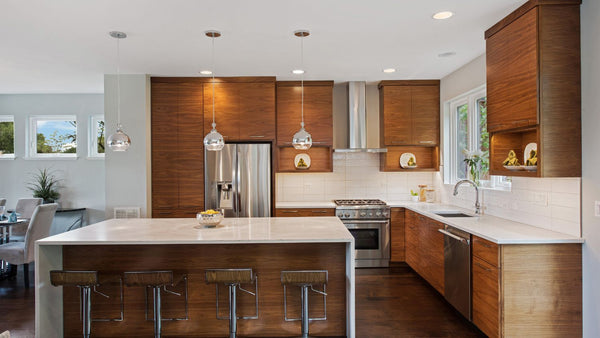
Quartz Composite vs. Natural Stone Counters
Quartz composite countertops are typically more eco-friendly than natural stone. While natural stone requires extensive quarrying, quartz composite is a blend of natural stone and recycled materials, reducing its environmental impact.
- Quartz Composite: Made from a combination of natural quartz and recycled materials like glass and resin, quartz composite countertops are engineered to be durable and eco-friendly. They require less energy to produce compared to natural stone, and the use of recycled materials minimizes waste.
- Natural Stone: Quarrying natural stone involves significant energy consumption and can lead to habitat destruction. However, if you choose natural stone, consider opting for locally sourced options to reduce transportation emissions.
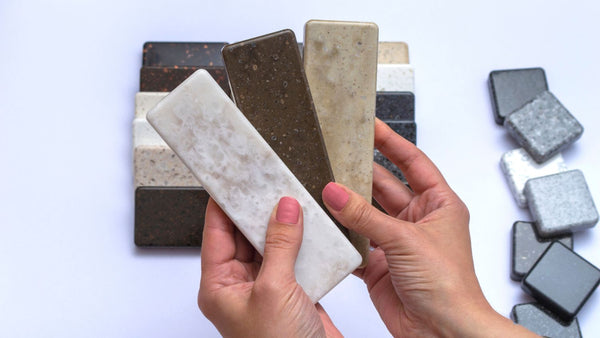
Recycled Glass Tiles for Backsplash
Opting for recycled glass tiles for your kitchen backsplash is an excellent eco-friendly choice. These tiles are crafted from recycled glass bottles and windows, diverting waste from landfills.
- Environmental Impact: Using recycled glass in tiles helps to conserve natural resources and reduce energy consumption. It also prevents the need for new raw materials, contributing to a more sustainable ecosystem.
- Design Versatility: Recycled glass tiles come in a wide array of colors, sizes, and patterns, allowing you to create a unique and visually appealing backsplash while maintaining an eco-conscious approach.
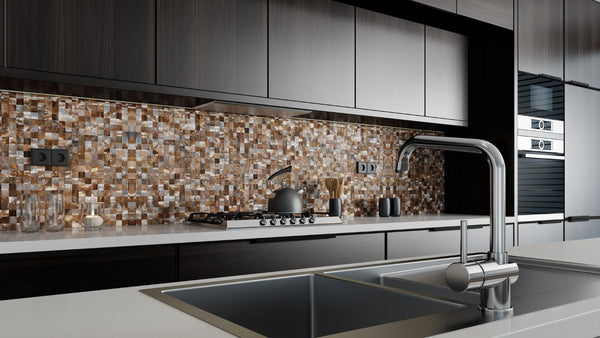
Energy-Efficient Appliances
Investing in energy-efficient appliances is a significant step towards creating an eco-friendly kitchen. Look for appliances with ENERGY STAR certification, which indicates that they meet high energy efficiency standards.
- Energy Savings: ENERGY STAR certified appliances use up to 30% less energy compared to standard models. This not only reduces your carbon footprint but also leads to substantial long-term cost savings on your energy bills.
- Additional Features: Many energy-efficient appliances come with advanced features like smart technology and improved insulation, further enhancing their eco-friendliness.
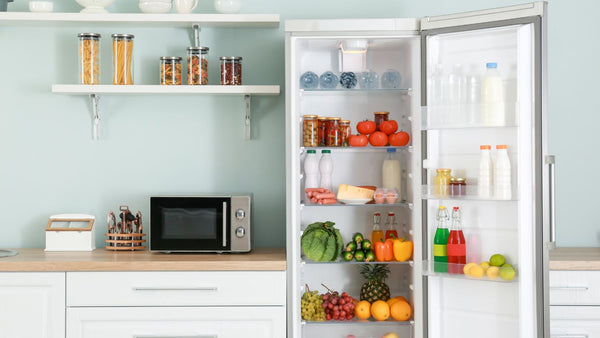
LED Under Cabinet Lighting
LED lighting is the most energy-efficient option for under cabinet lighting. It consumes significantly less electricity compared to traditional incandescent or fluorescent bulbs.
- Longevity: LED bulbs have an exceptionally long lifespan, reducing the frequency of replacements and minimizing waste.
- Low Heat Emission: LED lights emit very little heat, which helps maintain a cooler kitchen environment and reduces the load on your air conditioning system.
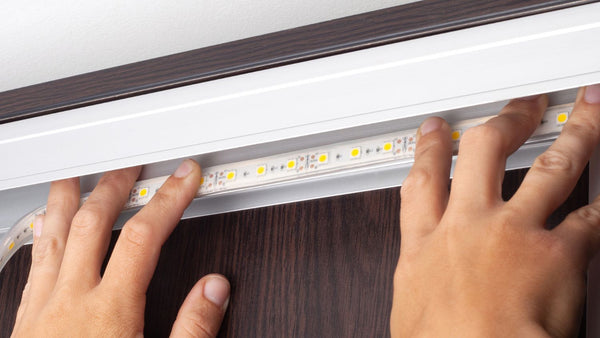
Low-Flow Faucets
Opting for low-flow faucets in your kitchen is a sustainable choice that helps conserve water. These faucets are designed to reduce water flow without compromising water pressure.
- Water Conservation: Low-flow faucets can reduce water usage by up to 60% compared to standard faucets. This not only conserves a precious natural resource but also lowers your water bills.
- Aerators for Efficiency: Many low-flow faucets come with built-in aerators, which mix air with the water stream to maintain adequate pressure. This ensures that you still have a powerful and efficient flow of water.
Water Filtration System
Installing a water filtration system in your kitchen ensures that you have access to clean and safe drinking water directly from the tap. This reduces the need for single-use plastic water bottles.
- Reduction of Plastic Waste: By using a water filtration system, you eliminate the need to purchase bottled water, which helps reduce plastic waste and its environmental impact.
- Improved Water Quality: Filtration systems remove impurities, contaminants, and pollutants from your tap water, providing you with a safer and better-tasting drinking water source.
Composting System
Sepura is a composting garbage disposal that makes food disposal easy, and composting convenient. Food washed down your sink is sent to an under-sink compost bin, so no food scraps enter your pipes which prevents clogs and damage.
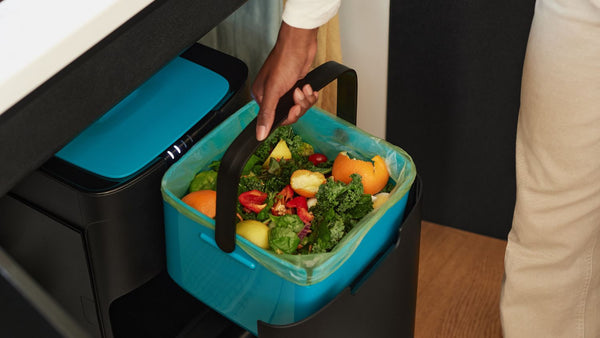
- Effortless Composting: Sepura simplifies the composting process. Wash all food scraps down your sink, and with a press of a button your scraps are collected in the compost bin, ready for your backyard or curbside compost.
- Low power: Sepura uses less power than an LED light bulb. With low power and minimal wear, Sepura will last you for years to come.
-
Reduce Food Waste: Divert over 175 pounds of food scraps each year by composting your food scraps with Sepura.
- Contribution to Sustainability: By using Sepura, you're actively participating in a sustainable waste management process. You're diverting organic waste from landfills, where it would emit harmful greenhouse gasses, and instead, creating a valuable resource for your garden.
Incorporating Sepura into your kitchen not only revolutionizes how you manage food waste but also supports a more environmentally conscious way of living. It's a win-win for both your household and the planet.
Conclusion
By choosing sustainable materials and implementing energy-efficient practices, you not only contribute to a healthier planet but also create a more functional and efficient kitchen space for yourself. Remember, every small change adds up to a significant positive impact on the environment.


